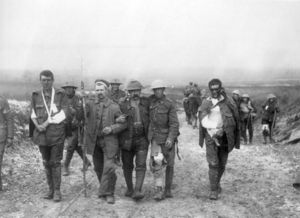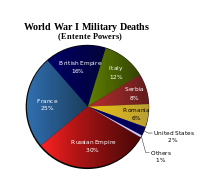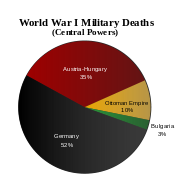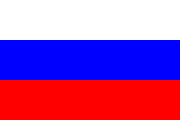World War I casualties


The total number of casualties in World War I, both military and civilian, were about 37 million: 16 million deaths and 21 million wounded. The total number of deaths includes 9.7 million military personnel and about 6.8 million civilians. The Entente Powers (also known as the Allies) lost about 5.7 million soldiers while the Central Powers lost about 4 million.
Unlike most (if not all) conflicts that took place in the 19th century and before, the majority of military deaths in World War I were caused by combat as opposed to disease. Improvements in medicine as well as the increased lethality of military weaponry were both factors in this development. Nevertheless, disease (including the Spanish flu) still caused a significant proportion of military deaths for all belligerents.
Contents |
Classification of casualty statistics
Estimates of casualty numbers for World War I vary to a great extent; estimates of total deaths range from 9 million to over 16.5 million [1] Military casualty statistics listed here include 6.8 million[2] combat related deaths as well as 2 million military deaths caused by accidents, disease and deaths while prisoners of war. When scholarly sources differ on the number of deaths in a country, a range of war losses is given, in order to inform readers that the death toll is uncertain. The table lists total deaths; the footnotes give a breakdown between combat and non-combat losses. The figures listed below include about 6 million civilian deaths due to war related famine and disease, these civilian losses are often omitted from other compilations of World War I casualties. The war disrupted trade resulting in acute shortages of food which resulted in famine in Europe, the Ottoman Empire and Africa. Civilian deaths include the Armenian Genocide, and it is debated if this event should be included with war losses. Civilian deaths due to the Spanish flu have been excluded from these figures, whenever possible. Furthermore, the figures do not include deaths during the Turkish War of Independence and the Russian Civil War. The data listed here is from official sources, whenever available. These sources are cited below.
Casualties by 1914 borders



| Allies of World War I | Population (millions) | Military deaths | Civilian deaths | Total deaths | Deaths as % of population | Military wounded |
|---|---|---|---|---|---|---|
| 4.5 | 61,928 | 61,928 | 1.38% | 152,171 | ||
| Canada d | 7.2 | 64,944 | 2,000 | 66,944 | 0.93% | 149,732 |
| 315.1 | 74,187 | 74,187 | 0.02% | 69,214 | ||
| 1.1 | 18,050 | 18,050 | 1.64% | 41,317 | ||
| 0.2 | 1,204 | 1,204 | 0.6% | 2,314 | ||
| 6.0 | 9,463 | 9,463 | 0.16% | 12,029 | ||
| 45.4 | 885,138 | 109,000 | 994,138 | 2.19% | 1,663,435 | |
| Sub-total for British Imperial Forces | - | 1,114,914 | 111,000 | 1,225,914 | - | 2,090,212 |
| East Africaa | See footnote | |||||
| 7.4 | 58,637 | 62,000 | 120,637 | 1.63% | 44,686 | |
| 39.6 | 1,397,800 | 300,000 | 1,697,800 | 4.29% | 4,266,000 | |
| 4.8 | 26,000 | 150,000 | 176,000 | 3.67% | 21,000 | |
| 35.6 | 651,000 | 589,000 | 1,240,000 | 3.48% | 953,886 | |
| 53.6 | 415 | 415 | 0% | 907 | ||
| 0.3 | See footnote | |||||
| 0.5 | 3,000 | 3,000 | 0.6% | 10,000 | ||
| 6.0 | 7,222 | 82,000 | 89,222 | 1.49% | 13,751 | |
| 7.5 | 250,000 | 430,000 | 680,000 | 9.07% | 120,000 | |
| 175.1 | 1,811,000 | 1,500,000 | 3,311,000 | 1.89% | 4,950,000 | |
| 4.5 | 275,000 | 450,000 | 725,000 | 16.11% | 133,148 | |
| 92.0 | 116,708 | 757 | 117,465 | 0.13% | 205,690 | |
| Total (Entente Powers) | 806.0 | 5,711,696 | 3,674,757 | 9,386,453 | 1.19% | 12,809,280 |
| Central Powers | Population (millions) | Military deaths | Civilian deaths | Total deaths | Deaths as % of population | Military wounded |
| 51.4 | 1,100,000 | 467,000 | 1,567,000 | 3.05% | 3,620,000 | |
| 5.5 | 87,500 | 100,000 | 187,500 | 3.41% | 152,390 | |
| 64.9 | 2,050,897 | 426,000 | 2,476,897 | 3.82% | 4,247,143 | |
| 21.3 | 771,844 | 2,150,000 | 2,921,844 | 13.72% | 400,000 | |
| Total (Central Powers) | 143.1 | 4,010,241 | 3,143,000 | 7,153,241 | 5% | 8,419,533 |
| Neutral nations | ||||||
| 2.7 | 722 | 722 | 0.03% | |||
| 2.4 | 1,892 | 1,892 | 0.08% | |||
| 5.6 | - | 877 | 877 | 0.02% | ||
| Grand total | 960.0 | 9,721,937 | 6,821,248 | 16,543,185 | 1.75% | 21,228,813 |
Casualties by modern borders
The war involved multi-ethnic empires such as Great Britain, France, Germany, Russia and Austro-Hungary. Large numbers of diverse ethnic groups were recruited or volunteered for military service.
 Austria
Austria
The following estimates of Austrian deaths, within contemporary borders, during World War I were made by a Russian journalist in a 2004 handbook of human losses in the 20th century. Total dead 175,000: including military losses 120,000 with the Austo-Hungarian forces and POW deaths in captivity of 30,000. Civilian dead due to famine and disease were 25,000 [3]
.svg.png) Belgian Congo
Belgian Congo
The Belgian Congo was part of the Kingdom of Belgium during the war. Following were the losses from that territory.
 Democratic Republic of the Congo (1914 known as the Belgian Congo): 5,000.[3]
Democratic Republic of the Congo (1914 known as the Belgian Congo): 5,000.[3]
 Czechoslovakia
Czechoslovakia
Czechoslovakia was part of Austro-Hungary during the war. The following estimates of Czechoslovak deaths, within 1991 borders, during World War I were made by a Russian journalist in a 2004 handbook of human losses in the 20th century. Total dead 185,000: including military losses 110,000 with the Austro-Hungarian forces and POW deaths in captivity of 45,000. Civilian dead due to famine and disease were 30,000. The Czechoslovak Legions fought with the armies of the Allies during the war.
 French colonies
French colonies
The following estimates of French colonial military deaths, within contemporary borders, during World War I were made by a Russian journalist in a 2004 handbook of human losses in the 20th century. Total military dead 82,000.[3]
 Algeria (1914 known as French Algeria): 26,000
Algeria (1914 known as French Algeria): 26,000 Vietnam (1914 known as French Indochina): 12,000
Vietnam (1914 known as French Indochina): 12,000 Mali (1914 part of French West Africa): 10,000
Mali (1914 part of French West Africa): 10,000 Morocco (1914 known as the French protectorate of Morocco): 8,000
Morocco (1914 known as the French protectorate of Morocco): 8,000 Senegal (1914 part of French West Africa): 6,000
Senegal (1914 part of French West Africa): 6,000 Guinea (1914 part of French West Africa): 2,500
Guinea (1914 part of French West Africa): 2,500 Madagascar: 2,500
Madagascar: 2,500 Benin (1914 part of French West Africa): 2,000
Benin (1914 part of French West Africa): 2,000 Burkina Faso (1914 part of French West Africa): 2,000
Burkina Faso (1914 part of French West Africa): 2,000 Republic of the Congo (1914 part of French Equatorial Africa):2,000
Republic of the Congo (1914 part of French Equatorial Africa):2,000 Côte d'Ivoire (1914 part of French West Africa): 2,000
Côte d'Ivoire (1914 part of French West Africa): 2,000 Tunisia (1914 known as French Tunisia): 2,000
Tunisia (1914 known as French Tunisia): 2,000 Chad (1914 part of French Equatorial Africa): 1,500
Chad (1914 part of French Equatorial Africa): 1,500 Central African Republic (1914 known as French Ubangi-Shari): 1,000
Central African Republic (1914 known as French Ubangi-Shari): 1,000 Niger (1914 part of French West Africa): 1,000
Niger (1914 part of French West Africa): 1,000 Gabon (1914 part of French Equatorial Africa): 500
Gabon (1914 part of French Equatorial Africa): 500
 German colonies
German colonies
The following estimates of German Colonial military deaths, within contemporary borders, during World War I were made by a Russian journalist in a 2004 handbook of human losses in the 20th century. Total military dead 17,000.[3]
 Namibia (1914 known as German South-West Africa): 10,000
Namibia (1914 known as German South-West Africa): 10,000 Cameroon (1914 known as Kamerun): 5,000
Cameroon (1914 known as Kamerun): 5,000 Togo (1914 known as German Togoland): 2,000
Togo (1914 known as German Togoland): 2,000
 Hungary
Hungary
The following estimates of Hungarian deaths, within contemporary borders, during World War I were made by a Russian journalist in a 2004 handbook of human losses in the 20th century. Total dead 385,000: including military losses 270,000 with the Austro-Hungarian forces and POW deaths in captivity of 70,000. Civilian dead due to famine and disease were 45,000.[3]
 Ireland
Ireland
Ireland was a part of the UK during World War I. The following estimates of Irish deaths, within contemporary borders, during the war were made by a Russian journalist in a 2004 handbook of human losses in the 20th century. Total dead 51,000: including military losses 50,000 with the British forces. POW deaths in captivity of 1,000.[3]
 Poland
Poland
Poland was occupied by Germany, Austria-Hungary and Russia from 1795–1918. A recent Polish study estimated 3.4 million Poles served in the Armed Forces of the occupying powers during World War One. Total deaths from 1914–18, military and civilian, within the 1919–1939 borders, were estimated at 1,130,000.[4] The following estimates of Polish deaths, within contemporary (post 1945) borders, during World War I were made by a Russian journalist in a 2004 handbook of human losses in the 20th century. Total dead 640,000: including military losses from Polish delegations of the following armies below. POW deaths in captivity of 20,000. Civilian losses due to the war included 120,000 due to military operations and 250,000 caused by famine and disease.[3] The ethnic Polish Blue Army served with the French Army. The ethnic Polish Legions fought as part of the Austro-Hungarian Army on the Eastern Front.
 Austria-Hungary (Polish Legions): 67,000
Austria-Hungary (Polish Legions): 67,000 German Empire: 87,000
German Empire: 87,000 Russian Empire: 96,000
Russian Empire: 96,000
 Romania
Romania
The territory of Transylvania was part of Austria-Hungary during World War I. The following estimates of Romanian deaths, within contemporary borders, during World War I were made by a Russian journalist in a 2004 handbook of human losses in the 20th century. Total dead 748,000: including military losses 220,000 with the Romanian forces and 150,000 with the Austro-Hungarian forces and POW deaths in captivity of 48,000. Civilian dead were as follows due to famine and disease 200,000, killed in military operations 120,000 and 10,000 dead in Austrian prisons.[3]
 Romanian Forces: 220,000
Romanian Forces: 220,000 Austo-Hungarian Forces: 150,000
Austo-Hungarian Forces: 150,000
 British colonies
British colonies
The following estimates of British Empire colonial military deaths, within contemporary borders, during World War I were made by a Russian journalist in a 2004 handbook of human losses in the 20th century. Total military dead 35,700.[3] Britain recruited Indian, Chinese, native South African, Egyptian and other overseas labour to provide logistical support in the combat theaters.[5] Included with British casualties in East Africa are the deaths of 44,911 recruited labourers. 21,12. The CWGC reports that nearly 2,000 workers from the Chinese Labour Corps are buried with British war dead in France.[6]
 Tanzania (1914 part of German East Africa): 20,000
Tanzania (1914 part of German East Africa): 20,000 Ghana (1914 known as the Gold Coast): 1,200
Ghana (1914 known as the Gold Coast): 1,200 Kenya (1914 known as British East Africa): 2,000
Kenya (1914 known as British East Africa): 2,000 Malawi (1914 known as Nyasaland): 3,000
Malawi (1914 known as Nyasaland): 3,000 Nigeria (1914 part of British West Africa): 5,000
Nigeria (1914 part of British West Africa): 5,000 Sierra Leone (1914 part of British West Africa): 1,000
Sierra Leone (1914 part of British West Africa): 1,000 Uganda (1914 known as the Uganda Protectorate): 1,500
Uganda (1914 known as the Uganda Protectorate): 1,500 Zambia (1914 known as Northern Rhodesia): 3,000
Zambia (1914 known as Northern Rhodesia): 3,000
 Kingdom of Yugoslavia
Kingdom of Yugoslavia
Slovenia, Croatia and Bosnia were part of Austria-Hungary during World War I. Serbia (including Macedonia) and Montenegro were independent nations. The following estimates of Yugoslav deaths, within 1991 borders, during World War I were made by a Russian journalist in a 2004 handbook of human losses in the 20th century. Total dead 996,000: including military losses 260,000 with the Serbian forces, 80,000 with the Austro-Hungarian forces 13,000 with Montenegro forces and POW deaths in captivity of 93,000. Civilian dead were as follows due to famine and disease 400,000, killed in military operations 120,000 and 30,000 dead in Austrian prisons or executed.[3]
Table sources
The main sources used for military and civilian deaths (unless stated otherwise in the footnotes below) are as follows:
- The Commonwealth War Graves Commission (CWGC) Annual Report 2007–2008 is the source of the military dead for the British Empire. The war dead totals listed in the report are based on the research by the CWGC to identify and commemorate Commonwealth war dead. The statistics tabulated by The Commonwealth War Graves Commission are representative of the number of names commemorated for all servicemen/women of the Armed Forces of the Commonwealth and former UK Dependencies, whose death was attributable to their war service. Some auxiliary and civilian organizations are also accorded war grave status if death occurred under certain specified conditions. For the purposes of CWGC the dates of inclusion for Commonwealth War Dead are 04/08/1914 to 31/08/1921. Total World War I dead were 1,114,914, (UK and former colonies 886,342; Undivided India 74,187; Canada 64,944; Australia 61,928; New Zealand 18,050; South Africa 9,463).[7]
- Statistics of the Military Effort of the British Empire During the Great War 1914–1920, The War Office March 1922.11 This official report lists 908,371 'soldiers' killed in action, died of wounds, died as prisoners of war and were missing in action in World War I, (UK and former colonies 704,121; Undivided India 64,449; Canada 56,639; Australia 59,330; New Zealand 16,711; South Africa 7,121.) 11,237. Listed separately were Royal Navy(including Royal Naval Air Service until 31/3/1918) war dead and missing of 32,287 11,339 and the Merchant Navy war dead of 14,66111,339; Figures for total Royal Flying Corps and Royal Air Force war dead were not given in the War Office report.11,495.
The losses of Bulgaria and Portugal were also listed in the War Office report.11,352-354 - Casualties and Medical Statistics, 1931,21 the final volume of the Official Medical History of the War, gives British Empire Army losses by cause of death. Total losses in combat theaters from 1914–1918 were 876,084, which included 418,361 killed, 167,172 died of wounds, 113,173 died of disease or injury, 161,046 missing and presumed dead and 16,332 prisoner of war deaths. These losses were not broken out for the UK and each Dominion. These figures do not include the losses of Dominion forces in the Gallipoli Campaign, since records were incomplete.[8]
- Huber, Michel La Population de la France pendant la guerre, Paris 1931.12This study published by the Carnegie Endowment for International Peace lists official data for war-related military deaths and missing of France and its colonies.
- Mortara, Giorgo La Salute pubblica in Italia durante e dopo la Guerra, New Haven: Yale University Press 1925. 20 The official government Italian statistics on war dead are listed here. A brief summary of data from this report can be found online.go to Vol 13, No. 15
- Urlanis, Boris Wars and Population, Moscow, 1971. Lists the military dead of Russia, Greece, Serbia and Montenegro.[9] The footnotes give his estimates of combat-related casualties; killed and missing in action or died of wounds for each nation.[2]
- Heeres-Sanitätsinspektion im Reichskriegsministeriums, Sanitätsbericht über das deutsche Heer, (Deutsches Feld- und Besatzungsheer), im Weltkriege 1914-1918, Volume 3, Sec. 1, Berlin 1934.[10] The official German Army medical war history listed German losses.
- Grebler, Leo and Winkler, Wilhelm The Cost of the World War to Germany and Austria-Hungary, Yale University Press, 1940. This study published by the Carnegie Endowment for International Peace details the losses of Austria-Hungary and Germany in the war,17
- Erickson, Edward J. Ordered to Die: A History of the Ottoman Army in the First World War, Greenwood 2001, ISBN 0313315167. The data published here for military casualties is from official Ottoman sources.14,211
- Hersch, Liebmann, La mortalité causée par la guerre mondiale, Metron- The International Review of Statistics, 1927, Vol 7. No 1. This study published in an academic journal detailed the demographic impact of the war on France, the UK, Italy, Belgium, Portugal, Serbia, Romania and Greece. The total estimated increase in the number of civilian deaths during the war was 2,171,000, not including an additional 984,000 Spanish Flu deaths. These indirect war losses were due to the severe shortages caused by the disruption of trade.[11]
- Tucker, Spencer C. ed. The European Powers in the First World War: An Encyclopedia This is the source for military wounded, unless stated otherwise. Civilian deaths in the Ottoman Empire are also listed in this source. 36
The source of population data is:
- Haythornthwaite, Philip J., The World War One Source Book Arms and Armour, 1993, 412 pages, ISBN 1854091026.
See also
- Thankful Villages - villages in England and Wales which lost no men in World War I
- Turkish-Armenian War, Armenian-Azerbaijani War, and Georgian-Armenian War 1918
- World War II casualties
Footnotes
^a The conflict in East Africa caused enormous civilian casualties. The Oxford History of World War One notes that "In east and central Africa the harshness of the war resulted in acute shortages of food with famine in some areas, a weakening of populations, and epidemic diseases which killed hundreds of thousands of people and also cattle." 33,100 The following estimates of civilian deaths during World War I were made by a Russian journalist in a 2004 handbook of human losses in the 20th century: Kenya 30,000; Tanzania 100,000; Mozambique 50,000; Rwanda 15,000; Burundi 20,000; and the Belgian Congo 150,000.[3] The reported military casualties of the UK, France, Germany, Belgium, and Portugal include Africans who served with their armed forces. The details are noted in the footnotes of the various nations.
^b Australia Included in total are 54,000 killed or missing in action and died of wounds.[2] The Commonwealth War Graves Commission Annual Report 2007–2008 is the source of the total 61,928 military dead.[7] Their 'Debt of Honour Register' lists the 1.7 million men and women of the Commonwealth forces who died during the two world wars.[12] The 1922 War Office report listed 59,330 Army war dead.[13]
^c Belgium: The total Includes 35,000 killed or missing in action and died of wounds.[2] Official Belgian government figures for military losses in Europe were 26,338 killed, died of wounds or accidents and 14,029 died of disease or missing. The total in Europe is 40,367. In Africa: 2,620 soldiers killed and 15,560 porter deaths, for a total in the African campaign of 18,270. The combined total for Europe and Africa is 58,63728,100 Another estimate (by the UK War Office in 1922) was 13,716 killed and 24,456 missing up until November 11, 1918. "These figures are approximate only, the records being incomplete." 11,352 The U.S. War Department in 1924 estimated 13,716 killed and died 25
Civilian deaths exceeded the prewar level by 92,000. 62,000 were caused by food shortages and German reprisals, and 30,000 by the Spanish Flu23,59-62 Prof. John Horne estimated that 6,500 Belgian and French civilians were killed in German reprisals.30
^d Canada The total includes 53,000 killed or missing in action and died of wounds.[2] The Commonwealth War Graves Commission Annual Report 2007–2008 gives a total 64,944 military dead [7].The Canadian Virtual War Memorial[14] contains a registry of information about the graves and memorials of Canadians and Newfoundlanders who served valiantly and gave their lives for their country. The losses for Newfoundland are listed separately on this table because it was not part of Canada at that time, but are included in the CVWM registry. The 1922 War Office report listed 56,639 Army war dead.[13] Civilian deaths were due to the Halifax Explosion
^e France The total includes 1,186,000 killed or missing in action and died of wounds.[2] The figure for total military dead of 1,397,800 is from a study published by the Carnegie Endowment for International Peace in 193112-. The total includes 71,100 French Colonial Forces, 4,600 foreign nationals, and 28,600 war-related military deaths occurring from 11/11/18 to 6/1/1919.12,414 The UK War Office in 1922 estimated French losses as 1,385,300 dead and missing, including 58,000 colonial soldiers.[15] The U.S. War Department in 1924 estimated 1,357,800 killed and died.25 The names of the soldiers who died for France during World War I are listed on-line by the French government.[16] The French encyclopedia Quid reports that 30-40,000 foreign volunteers from about 40 nationalities served in the French army. At the end of the war 12,000 were in the Czechoslovak Legions and the ethnic Polish Blue Army. 5,000 Italians served in a "Legion" commanded by Colonel Garibaldi. There were also 1,000 Spaniards and 1,500 Swiss in French service. 200 American volunteers served with the French from 1914–16, including the Lafayette Escadrille.[17] Luxembourg was occupied by Germany during the war. 3,700 Luxembourg citizens served in the French armed forces. 2,800 gave their lives in the war.[18] They are commemorated at the Gëlle Fra in Luxembourg. The French Armenian Legion served as part of the French Armed forces during the war.
Civilian deaths exceeded the prewar level by 500,000. 300,000 were caused by military operations and food shortages, and 200,000 by the Spanish Flu23,30-47, Civilian dead include 1,509 merchant sailors12,314, and 3,357 killed in air attacks and long range artillery bombardments12,312-13
^f Greece Included in total are 11,000 killed or missing in action and died of wounds.[2] The Soviet demographer Boris Urlanis estimated total military dead of 26,000 including 15,000 deaths due to disease6,160. Jean Bujac in a campaign history of the Greek Army in World War I listed 8,365 combat related deaths and 3,255 missing 13,339. Other estimates of Greek casualties are as follows: By UK War Office in 1922: Killed/died wounds 5,000; prisoners and missing 1,000.11,353 By US War Dept in 1924: killed and died 5,000 25
Civilian deaths exceeded the prewar level by 150,000, caused by food shortages and the Spanish Flu23,80-81
^g Indian EmpireThe Indian Empire included present day India, Pakistan and Bangladesh. Included in total are 27,000 killed or missing in action and died of wounds.[2] The Commonwealth War Graves Commission Annual Report 2007–2008 is the source of the total 74,187 military dead [7]. The 'Debt of Honour Register' from the Commonwealth War Graves Commission lists the 1.7m men and women of the Commonwealth forces who died during the two world wars.[12] The 1922 War Office report listed 64,454 Army war dead(including 2,393 British soldiers serving with the Indian forces).[13]
^h Italy Included in total are 433,000 killed or missing in action and died of wounds[2] The figure 651,000 military dead is from a 1925 Italian demographic study of war deaths based on official government data published by Yale Univ. Press. The details are as follows, Killed in action or died of wounds 378,000; died of disease 186,000 and an additional 87,000 deaths of invalids from 12 Nov. 1918 until 30 April 1920 due to war related injuries. 20,28-29. Other estimates of Italian casualties were: by UK War Office in 1922, Dead 460,00011,352and by the US War Dept in 1924 650,000 killed and died25 Civilian deaths exceeded the prewar level by 1,021,000. 589,000 caused by food shortages and 432,000 by the Spanish Flu23,52-59, civilian deaths due to military action were about 3,400 including 2,293 by attacks on shipping, 958 during air raids and 142 by sea bombardment20,57-66.
^i Japan War dead figure of 415 is from a 1991 history of the Japanese Army19,111. However, Michael Clodfelter reported the official toll was put at 300 KIA and noted that "A more reliable count of total Japanese military deaths from all causes lists 1,344 fatalities."[19] Casualties reported by the US War Dept in 1924 were 300 killed and died 25
^j Luxembourg remained under German control during the war. Some citizens were conscripted into the German forces. Others escaped to volunteer for the Allies.31 3,700 Luxembourgian nationals served in the French Army, of whom 2,800 died.[20] They are commemorated at the Gëlle Fra in Luxembourg.
^k Montenegro: Michael Clodfelter lists 3,000 battle deaths and 7,000 missing and POW."[19] However, the Yugoslav government in 1924 listed 13,325 military war dead from Montenegro.[21] Casualties Reported by the US War Dept in 1924 were 3,000 killed and died 25
^l New Zealand: Included in total are 14,000 killed or missing in action and died of wounds.[2] The Commonwealth War Graves Commission Annual Report 2007–2008 is the source of the total 18,050 military dead [7]. The 'Debt of Honour Register' from the Commonwealth War Graves Commission lists the 1.7m men and women of the Commonwealth forces who died during the two world wars.[12] The 1922 War Office report listed 16,711 Army war dead.11,237
^m Newfoundland was a separate dominion at the time, and not part of Canada.[12]
The 1922 War Office report listed 1,204 Army war dead.11,237
^n Portugal: Included in total are 6,000 killed or missing in action and died of wounds.[2] Total war dead reported by British War Office were 7,022 including the following: killed and died of other causes up until January 1, 1920; 1,689 in France and 5,333 in Africa. Figures do not include an additional 12,318 listed as missing and POW. Africans are included in these figures11,354. Another estimate of Portuguese casualties by the US War Dept in 1924 was 7,222 killed and died25 Civilian deaths exceeded the prewar level by 220,000, 82,000 caused by food shortages and 138,000 by the Spanish Flu23,61-64
^o Romania: Included in total are 177,000 killed or missing in action and died of wounds.[2] The statistic of 250,000 military dead is "The figure reported by the Rumanian Government in reply to a questionnaire from the International Labour Office"[22]. Other estimates of Romanian casualties are as follows: By UK War Office in 1922: 335,706 Killed and missing 11,353- By US War Dept in 1924: 335,706 killed and died 25
Civilian deaths exceeded the prewar level by 430,000, caused by food shortages, epidemics and the Spanish Flu23,76-80
^p Russian Empire Included in total are 1,451,000 killed or missing in action and died of wounds.[2] The estimate of the 1,811,000 total Russian military and 1,500,00 civilian deaths was made by the Soviet demographer Boris Urlanis.6,46-57. Other estimates of Russian casualties are as follows: By UK War Office in 1922: Killed 1,700,00011,353-By the US War Dept in 1924 1,700,000 killed and died 25 A 2001 study by the Russian military historian G.F. Krivosheev provided these revised figures- Killed in action 1,200,000; missing in action 439,369; died of wounds 240,000, gassed 11,000., died from disease 155,000, POW deaths 190,000, deaths due to accidents and other causes.19,000. Total war dead 2,254,369. Wounded 3,749,000. POW 3,342,900. 34
Civilian deaths from 1914–1917 exceeded the prewar level by 1,500,000 due to famine and disease and military operations.6,268. The following estimate of civilian deaths on the eastern front during World War I was made by a Russian journalist in a 2004 handbook of human losses in the 20th century. Total civilian deaths on the territory of the former Soviet Union and Poland were estimated at 1,440,000, including 460,000 due to military operations.[3]
^q Kingdom of Serbia Included in total are 165,000 killed or missing in action and died of wounds.[2] The estimate of total combined Serbian and Montenegrin military losses of 278,000 was made by the Soviet demographer Boris Urlanis6,62-64 Other estimates of Serbian casualties are as follows: By Yugoslav government in 1924: Killed 365,164 6,62-63. By UK War Office in 1922: Killed 45,000, missing 82,53511,353-By US War Dept in 1924: 45,000 killed and died 25
Civilian deaths exceeded the prewar level by 450,000, due to food shortages, epidemics and the Spanish Flu23,65-76
^r South Africa Included in total are 5,000 killed or missing in action and died of wounds.[2] The Commonwealth War Graves Commission Annual Report 2007–2008 is the source of the 9,463 total military dead [7].
The 1922 War Office report listed 7,121 Army war dead11,237.
^s UK and Colonies Included in total are 624,000 killed or missing in action and died of wounds6,85. The Commonwealth War Graves Commission Annual Report 2007–2008 is the source of total 886,342 UK military dead(including 1,204 listed under Newfoundland)[7] their 'Debt of Honour Register' lists the 1.7m men and women of the Commonwealth forces who died during the two world wars.[12] The losses of Newfoundland are listed separately on this table.
The official "final and corrected" casualty figures for British Army,including the Territorial Force were issued on 10 March 1921. The losses were for the period 4 August 1914 until 30 September 1919, including 573,507 "killed in action, died from wounds and died of other causes"; 254,176 missing less 154,308 released prisoners; for a net total of 673,375 dead and missing. There were 1,643,469 wounded also listed in the report.27,PartIV p. 62-72
The 1922 War Office report detailed the casualties of "soldiers who lost their lives", "killed in action, died as prisoners, died of wounds and missing" from the Regular and Territorial Forces and Royal Naval Division: 702,410 from the U.K., 507 from "other colonies" and 2,393 British serving in the Indian Empire Army 11,237. The figures do not include Royal Navy war dead of 32,287 11,339 and the Merchant Navy war dead of 14,661, which were listed separately 11,339; Figures for total RAF war dead were not given in the War Office report.11,495.
Civilian deaths exceeded the prewar level by 292,000. 109,000 due to food shortages and 183,577 by the Spanish Flu23,47-61
The 1922 War Office report detailed the deaths of 1,260 civilians and 310 military personnel due to air and sea bombardment of the UK.11,674-678. Losses at sea were 908 UK civilians and 63 fisherman killed by U-Boat attacks18,78
^t United States The official figures of military war deaths listed by the US Dept. of Defense for the period ending Dec. 31, 1918 are 116,516; which includes 53,402 battle deaths and 63,114 non combat deaths.[23],The US Coast Guard lost an additional 192 dead.."[24] An official 1920 US Quartermaster report reports the total number of registered US graves in France; Great Britain; Belgium, Germany; Luxemburg and Italy as 75,212 [25] {this figure includes remains removed from Europe to the United States} and that as of June 30, 1920 2,217 remains had been removed from Europe to U.S.[26].
United States estimated civilian losses include 128 killed on the RMS Lusitania as well as 629 Merchant Marine personnel killed on merchant ships,[27].
^u Austria-Hungary Included in total are 900,000 killed or missing in action and died of wounds.[2] The figure of total estimated 1,100,000 military dead is from a study published by the Carnegie Endowment for International Peace in 1940, based on analysis of Austro-Hungarian War Dept. data.17,179 Other estimates of Austro-Hungarian casualties are as follows: By Austrian Ministry of Defense in 1938: Military dead 1,016,20026, VII, Beilage 37 By UK War Office in 1922: Dead 1,200,0011,357 By US War Dept in 1924: 1,200,00 killed and died 25A study published by the Carnegie Endowment for International Peace in 1940 estimated civilian 467,000 deaths "attributable to war", the primary cause being famine.17,147
^v Bulgaria: Included in total are 62,000 killed or missing in action and died of wounds.[2] 87,500 total military war dead were reported by the Bulgarian War Office including 48,917 killed, 13,198 died of wounds, 888 accidentally killed, 24,497 died of disease, "losses during the retreat from sickness and privations were much greater than the figures they possess".11,354. The US War Dept in 1924 also listed 87,500 killed and died 25
Civilian deaths exceeded the prewar level by 100,000 6,268. due to food shortages.
^w German Empire Included in total are 1,796,000 killed or missing in action and died of wounds.[2] The official German medical war history listed 2,036,897 military war dead. Including confirmed military dead from all causes: Army 1,900,876, Navy 34,836 ,Colonial troops 1,185 and an estimated 100,000 missing and presumed dead.[28] -To these figures we must add an additional 14.000 African conscript deaths during the war.11,355 Total dead 2,050,897.[28] -Other estimates of German casualties are as follows: By UK War Office in 1922: Killed 1,808,545 exclusive of 14.000 African conscript deaths during the war.11,355- By US War Dept in 1924: 1,773,700 killed and died 25
Civilian deaths exceeded the pre-war level by about 700,000. The primary causes were famine during the war (424,000 deaths) and the Spanish flu (200,000 deaths). The figures of civilian war related deaths are from a study published by the Carnegie Endowment for International Peace in 1940, based on analysis of German government data.17,78, there were an estimated additional 100,000 civilian deaths during the blockade of Germany after the armistice from November 1918 until June 1919 which are not included with war losses.[29] 720 German civilians were killed by air attacks. 11,678
^x Ottoman Empire: Ottoman military casualties listed here are from data in the Ottoman Archives which total 771,844 war dead including 243,598 killed in action, 61,487 missing action and 466,759 deaths due to disease. The number of wounded was 763,753 and POWs 145,10414,211 , 37 Other estimates of Ottoman military casualties are as follows: By UK War Office in 1922: Killed 50,000, died wounds 35,000, died of disease 240,000 11, By US War Dept in 1924: 325,000 killed and died25 Total Ottoman population losses from 1914–1922 were approximately 5 million[30] including the Spanish flu deaths, the Turkish War of Independence from 1919–1922 and the Population exchange between Greece and Turkey, these other population losses are not included with the casualties of World War I.
^y Denmark was neutral in the war. However, Germany at that time included part of Danish Schleswig. 30,000 men from this area served in German forces, and 3,900 were killed. These losses are included with German casualties. 722 Danish merchant sailors died, mostly due to vessels torpedoed by German submarines.[31]
^z Norway and Sweden were both neutral in the war. They both lost ships and merchant sailors in trading through the war zones. Norway lost about 50% of its merchant fleet, percentage-wise the highest loss of any nation's merchant fleet in WW I.[32] 1,892 Norwegian merchant sailors died, mostly due to vessels torpedoed by German submarines. 877 Swedish merchant sailors died, mostly due to vessels torpedoed or sunk by mines.[33]
General
- ↑ White. "World War I casualties". Twentieth Century Atlas. http://users.erols.com/mwhite28/warstat1.htm. Retrieved 2008-12-21.
- ↑ 2.00 2.01 2.02 2.03 2.04 2.05 2.06 2.07 2.08 2.09 2.10 2.11 2.12 2.13 2.14 2.15 2.16 2.17 Urlanis, Boris (1971). Wars and Population. Moscow. p. 85.
- ↑ 3.00 3.01 3.02 3.03 3.04 3.05 3.06 3.07 3.08 3.09 3.10 3.11 Erlikman, Vadim (2004). Poteri narodonaseleniia v XX veke : spravochnik. Moscow. ISBN 5-93165-107-1.
- ↑ Andrzej Gawryszewski (2005). Ludnosc Polski w XX wieku. Warsaw.
- ↑ The Labour Corps of 1917–1918
- ↑ Commonwealth War Graves Commission, THE CHINESE LABOUR CORPS AT THE WESTERN FRONT
- ↑ 7.0 7.1 7.2 7.3 7.4 7.5 7.6 Commonwealth War Graves Commission Annual Report 2007–2008 Online
- ↑ Mitchell, T.J. (1931). Casualties and Medical Statistics of the Great War. London: Reprinted by Battery Press (1997). p. 12. ISBN 0898392632.
- ↑ Urlanis, Boris (1971). Wars and Population. Moscow. p. 209.
- ↑ Heeres-Sanitaetsinspektion im Reichskriegsministeriums (1934) (in German). Sanitaetsbericht über das deutsche Heer, (deutsches Feld- und Besatzungsheer), im Weltkriege 1914-1918. Volume 3, Sec 1. Berlin.
- ↑ The article is available from Metron, the publisher
- ↑ 12.0 12.1 12.2 12.3 12.4 Research world war casualties at direct.gov.uk
- ↑ 13.0 13.1 13.2 The War Office (1922). Statistics of the Military Effort of the British Empire During the Great War 1914–1920. Reprinted by Naval & Military Press. p. 237. ISBN 1847346812.
- ↑ Canadian Virtual War Memorial
- ↑ The War Office (1922). Statistics of the Military Effort of the British Empire During the Great War 1914–1920. Reprinted by Naval & Military Press. p. 352. ISBN 1847346812.
- ↑ SGA Mémoire des hommes
- ↑ Quid
- ↑ National Museum of Military History, Grand Duchy of Luxembourg
- ↑ 19.0 19.1 Clodfelter, Michael. Warfare and Armed Conflicts- A Statistical Reference to Casualty and Other Figures, 1500–2000 2nd Ed.. 2002. p. 483. ISBN 0-7864-1204-6.
- ↑ Doody, Richard. "The Grand Duchy of Luxembourg". http://worldatwar.net/nations/luxembourg/narrative.html. Retrieved 2006-07-23.
- ↑ Urlanis, Boris (1971). Wars and Population. Moscow. pp. 62–63.
- ↑ Urlanis, Boris (1971). Wars and Population. Moscow. p. 64.
- ↑ Congressional Research Service, American War and Military Operations Casualties:Lists and Statistics
- ↑ Clodfelter, Michael (2002). Warfare and Armed Conflicts- A Statistical Reference to Casualty and Other Figures, 1500–2000 2nd Ed.. p. 481. ISBN 0-7864-1204-6.
- ↑ Report of the Quartermaster general ,U.S. Army to the Secretary of War.p.60
- ↑ Ibid .p.61
- ↑ American Merchant Marine at War, www.usmm.org
- ↑ 28.0 28.1 Heeres-Sanitaetsinspektion im Reichskriegsministeriums (1934) (in German). Sanitaetsbericht über das deutsche Heer, (deutsches Feld- und Besatzungsheer), im Weltkriege 1914-1918. Volume 3, Sec 1. Berlin. pp. 7–14.
- ↑ Bane, S.L.; Lutz R. H., (1942). The Blockade of Germany after the Armistice 1918–1919. Stanford University Press. p. 791.
- ↑ Gelvin, James L.. The Israel-Palestine Conflict: One Hundred Years of War. Cambridge University Press. p. 77. ISBN 0521852890.
- ↑ Monumenter i købstaden 1864-1920
- ↑ Norway info -The history of Norway
- ↑ World War I Swedish Ship Losses
References
- Everett, Susanne (1980). World War I–An Illustrated History. Bison Books. ISBN 0671069330.
- Nicolson, Colin (2001). The Longman Companion to the First World War. Longman. ISBN 0-582-28983-1.
- ^3 Bird, Will R. (2000). The Communication Trench, Anecdotes & Statistics from The Great War 1914–1918. Ottawa: CEF Books. ISBN 1896979092.
- ^5 Hirschfeld, Gerhard (Ed.), Enzyklopaedie Erster Weltkrieg, Paderborn, 2004, ISBN 3506739131 (esp. article "Kriegsverluste" by Ruediger Overmans P. 663-666)
- ^6 Urlanis, Boris (1971). Wars and Population. Moscow.
- ^7 Urlanis, Boris (1965). Bilanz der Kriege. Berlin. ISBN 0-7864-1204-6.
- Heeres-Sanitaetsinspektion im Reichskriegsministeriums (1934) (in German). Sanitaetsbericht über das deutsche Heer, (deutsches Feld- und Besatzungsheer), im Weltkriege 1914–1918. Volume 3, Sec 1. Berlin.
- ^9 Dumas, Samuel (1923). Losses of Life Caused by War. Oxford.
- Clodfelter, Michael (2002). Warfare and Armed Conflicts- A Statistical Reference to Casualty and Other Figures, 1500–2000 2nd Ed.. ISBN 0-7864-1204-6.
- ^11 The War Office (1922). Statistics of the Military Effort of the British Empire During the Great War 1914–1920. Reprinted by Naval & Military Press. ISBN 1847346812.
- ^12 Huber, Michel (1931). La Population de la France pendant la guerre. Paris.
- ^13 Bujac, Jean, Les campagnes de l'armèe Hellènique, 1918–1922, Paris, 1930
- ^14 Erickson, Edward J., Ordered to Die: A History of the Ottoman Army in the First World War, Greenwood 2001. ISBN 0313315167
- ^15 The Commonwealth War Graves Commission Debt of Honour Register
- ^16 Grey, Randal (1991). Chronicle of the First World War, Vol II: 1917–1921. Facts On File. ISBN 0816025959.
- ^17 Grebler, Leo (1940). The Cost of the World War to Germany and Austria-Hungary. Yale University Press. ISBN 0816025959.
- ^18 Gilbert, Martin (1994). Atlas of World War I. Oxford UP. ISBN 0195210778.
- ^19 Harries, Merion (1991). Soldiers of the Sun-The Rise and Fall of the Imperial Japanese Army. Random House. ISBN 0679753036.
- ^20 Mortara, G (1925). La Salute pubblica in Italia durante e dopo la Guerra. New Haven: Yale University Press.
- ^21 Mitchell, T.J. (1931). Casualties and Medical Statistics of the Great War. London: Reprinted by Battery Press (1997). ISBN 0898392632.
- Gelvin, James L.. The Israel-Palestine Conflict: One Hundred Years of War. Cambridge University Press. ISBN 0521852890.
- ^23 Hersch, L., La mortalité causée par la guerre mondiale, Metron- The International Review of Statistics, 1927, Vol 7.
- ^24 Ellis, John (1993). World War I–Databook. Aurum Press. ISBN 1854107666.
- ^25 US War Dept 1924 data listed in the Encyclopædia Britannica
- ^26 Österreichischen Bundesministerium für Herrswesen (1938). Österreich-Ungarns letzer Kreig, 1914-1918 Vol. 7. Vienna.
- ^27 The Army Council. General Annual Report of the British Army 1912–1919. Parliamentary Paper 1921, XX, Cmd.1193.
- ^28 l'Annuaire statistique de la Belgique et du Congo Belge 1915-1919. Bruxelles. 1922.
- ^30 Horne, John and Kramer, Alan, German Atrocities, 1914 ISBN 0300089759
- ^31 Haythornthwaite, Philip J. (1992). The World War One Sourcebook. Arms and Armour. ISBN 1854091026.
- ^33 Strachan, Hew (1999). World War I: A History. Oxford University Press. ISBN 9780198206149.
- ^34 Krivosheeva, G.F. (2001). Rossiia i SSSR v voinakh XX veka : poteri vooruzhennykh sil : statisticheskoe issledovanie / pod obshchei redaktsiei. Moscow: OLMA-Press. http://lib.ru/MEMUARY/1939-1945/KRIWOSHEEW/poteri.txt#w02.htm-186.
- Erlikman, Vadim (2004). Poteri narodonaseleniia v XX veke : spravochnik. Moscow. ISBN 5-93165-107-1.
- ^36 Tucker, Spencer C (1999). The European Powers in the First World War: An Encyclopedia. New York: Garland Publishing. ISBN 0-8153-3351-X.
- ^37 Emin, Ahmed (1930). Turkey in the World War. Yale.
- Bane, S.L.; Lutz R. H., (1942). The Blockade of Germany after the Armistice 1918–1919. Stanford: Stanford Iniv. Press.
- Andrzej Gawryszewski (2005). Ludnosc Polski w XX wieku. Warsaw.
External links
- Casualties of World War I from "Trenches on the Web"
- Miscellaneous World War I Overseas Casualty Reports from genealogybuff.com
- World War I casualties from Historical Atlas of the Twentieth Century
- Casualties of World War I from about.com
- World War I troop statistics - Troop Strength, Wounded, and Casualty Statistics from digitalsurvivors.com
|
|||||||||||||||||||||||||||||||||||||||||||||||||||||||||||
